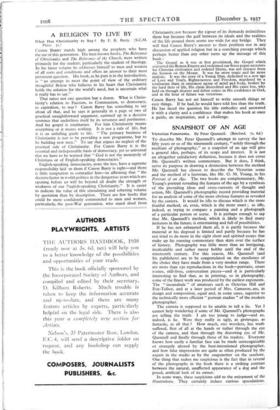A RELIGION TO LIVE BY
What Has Christianity to Say ? By F. R. Barry. (S.C.M. Press. 5s.) CANON BARRY stands high among the prophets who have the ear of this generation. His best-known books, The Relevance of Christianity and The Relevance of the Church, were written primarily for the student, particularly the student of theology. In his latest volume he addresses himself to men and women of all sorts and conditions and offers an answer to their most persistent question. His book, as he puts it in the introduction, is " an attempt to meet the point of view of the ordinary thoughtful Briton who believes in his heart that Christianity holds the solution for the world's need, but is uncertain what it really has to say."
That raises not one question but a dozen. What is Christ- ianity's relation to Fascism, to Communism, to democracy, to capitalism, to war ? Canon Barry has something to say about all that, and he says it generally in a page or two of practical straightforward argument, summed up in a decisive sentence that underlines itself by its terseness and pertinence. And his gospel is totalitarian. For him Christianity means everything or it means nothing. It is not a rule of life, but it is an unfailing guide to life. " The primary business of Christianity is not to be providing a new programme, but to be building new men." To say that argues no neglect of the practical side of Christianity. For Canon Barry it is the essential and indispensable basis of democracy, yet so universal that we have to be warned that " God is not the monopoly of Christians or of English-speaking democracies."
English-speaking democracies, none the less, have a supreme responsibility laid .m them if Canon Barry is right—and there is little temptation to contradict him—in affirming that " the decisive factor in world-politics in the dangerous years which are opening before us will be beyond all doubt the strength or weakness of our F.nglish-speaking Christianity." It is easier to indicate the value of this stimulating and sobering volume by quotation than by description. There are few books that could be more confidently commended to men and women, particularly, the post-War generation, who stand aloof from
Christianity, not because the rigour_of.its demands intimidates them but because the gulf between its ideals and the realities of the life around them seems too wide for any bridge. They will find Canon Barry's answer to their problem not in any discussion of applied religion but in a searching passage which perhaps better than any other sums up the message of this book :
The Gospel as it was at first proclaimed, the Gospel which converted the Roman Empire and reclaimed our fierce pagan ancestors for Christian civilisation and ordered liberty, was not extracts from the Sermon on the Mount. It was far more tragic and far more realistic. It was the story of a Young Man, dedicated to a new age of Love and Truth, Righteousness and Freedom, murdered by a totalitarian State in uttermost agony of mind and body, broken by the hard facts of life, His claim discredited and His cause lost, who held on through disaster and defeat seren.e. in His confidence in God, and in the hour of failure was victorious.
Canon Barry has not set himself to write smooth things or easy things. If he had, he would have told less than the truth. He has faced the question his title embodies and answered it with a clarity and a confidence that makes his book at once a guide, an inspiration, and a challenge.


























































 Previous page
Previous page